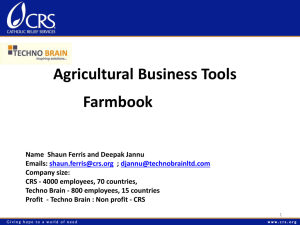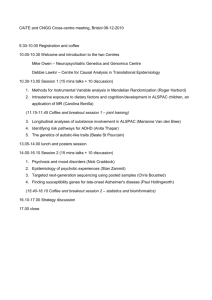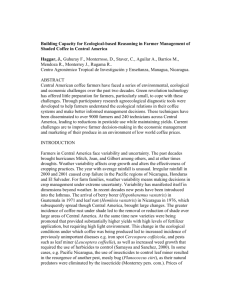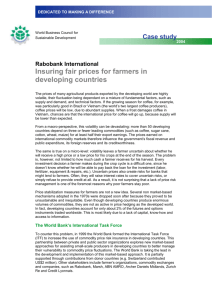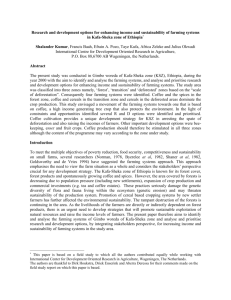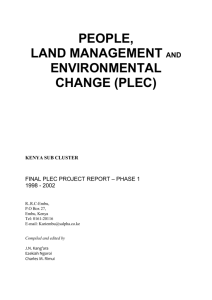Not just about the coffee
advertisement
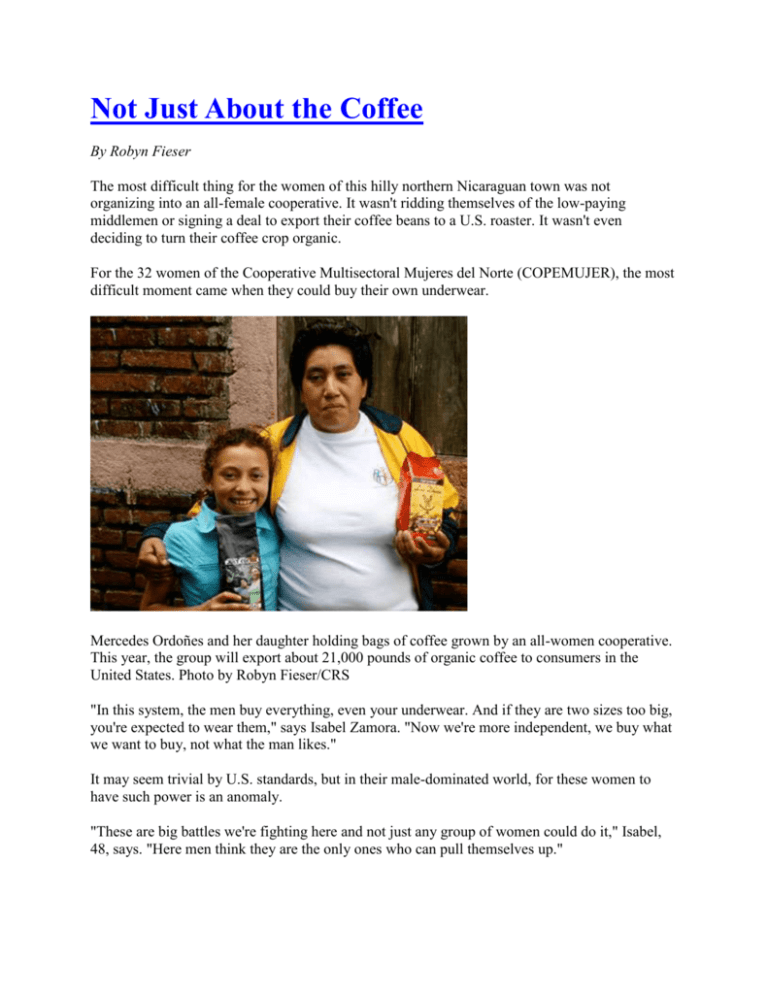
Not Just About the Coffee By Robyn Fieser The most difficult thing for the women of this hilly northern Nicaraguan town was not organizing into an all-female cooperative. It wasn't ridding themselves of the low-paying middlemen or signing a deal to export their coffee beans to a U.S. roaster. It wasn't even deciding to turn their coffee crop organic. For the 32 women of the Cooperative Multisectoral Mujeres del Norte (COPEMUJER), the most difficult moment came when they could buy their own underwear. Mercedes Ordoñes and her daughter holding bags of coffee grown by an all-women cooperative. This year, the group will export about 21,000 pounds of organic coffee to consumers in the United States. Photo by Robyn Fieser/CRS "In this system, the men buy everything, even your underwear. And if they are two sizes too big, you're expected to wear them," says Isabel Zamora. "Now we're more independent, we buy what we want to buy, not what the man likes." It may seem trivial by U.S. standards, but in their male-dominated world, for these women to have such power is an anomaly. "These are big battles we're fighting here and not just any group of women could do it," Isabel, 48, says. "Here men think they are the only ones who can pull themselves up." This year the women, who own 108 acres between them, inked a deal with U.S. fair trade coffee distributor, Just Coffee. They will be able to sell their coffee for $2 per pound, a high price even for fair trade. All but one of the growers in the cooperative are now certified organic. And everyone's children are in school. Despite the progress, they are still working at a rudimentary level. Some of the women drag their harvest miles to the closest wet mill to wash and sort their beans. And affordable organic fertilizer is so scarce that one cooperative member has resorted to collecting bat guano to feed the plants. Growing Local, Going Global The women know that taking the next step—growing more coffee and maintaining the artisan quality—will require a major investment. They need to rehab acres of old, low-producing plants, build a wet mill and solve the fertilizer shortage. That's where Catholic Relief Services comes in. Paola collects bat guano to mix with cow dung for organic fertilizer. Still, what she produces is not enough to cover the 108 acres farmed by the women in the cooperative. Photo by Robyn Fieser/CRS The women of COPEMUJER are part of a $7.6-million USAID-funded project known as ACORDAR (Alliance to Create Opportunities for Rural Development through Agroenterprise Relationships). Jefferson Shriver, the project's director for CRS, describes the women as "market-ready" growers. They are farmers trying to transition from selling at local levels, where pay is low and unpredictable, to competing within formal supply chains. Over the next two years, the ACORDAR project will help 5,400 farmers in 44 municipalities grow premium products and compete in formal markets. Like the women of Pueblo Nuevo, what many of the farmers need is the technical know-how and means to access new infrastructure and agricultural equipment. "In the past, we have worked with a number of poor farmers who only grow enough to feed their families," says Shriver. "With ACORDAR, we will be working with a lot of those same farmers—and some new ones—to help them to produce and sell their products on competitive and profitable markets—at the national levels, in supermarkets, and on the regional and international levels, all of which demand a better quality product but ultimately pay a better price." Shriver says growing a good crop is no longer a guarantee for survival in Nicaragua, the secondpoorest country in Latin America after Haiti. As supermarkets replace traditional markets in popularity, and competition increases from regional and even international producers, many small, rural farmers are being forced to find alternatives to selling their harvest from the backs of their pickup trucks. Today, success depends on getting those crops on supermarket shelves—in Nicaragua and beyond—and into the hands of buyers both regionally and internationally. To do that, says Shriver, farmers need help at different steps along the way. Through ACORDAR, farmers receive training on crop diversification, processing and postharvest techniques to meet national and international agricultural standards. They also learn business and management skills, including the use of critical market-pricing information so that farmers can sell their crops at the best possible time. Infrastructure improvements will include a commercialization facility, a packing center, a coffee dry mill processing center, community storage centers, a biofertilizer plant, wet mills and fermentation facilities. "What makes this project so different from past projects is how it involves such a broad range of actors. We are engaging with a group of international and local NGOs [nongovernmental organizations], municipal governments, and the private sector, in an effort to make the market work for small producers," says Conor Walsh, CRS' country representative in Nicaragua. "Each has something unique to contribute: whether it's an NGO providing technical assistance for farmers, a technical institute helping cooperatives form competitive businesses, or a private sector buyer offering more favorable terms of trade; all are doing their part to make it possible for small producers to reap the benefits of markets and eventually work their way out of poverty." For the women of COPEMUJER, assistance will come in several forms, from improved access to credit to investments in infrastructure. The cooperative and three other all-female cooperatives organized under CRS partner La Fem, a Nicaraguan organization dedicated to the empowerment of women, are already drawing from a line of credit provided by CRS. The loans, which many of the women take out at the beginning of the harvest season in November, pay for fertilizer, equipment and other expenses over the long months before payment is received from U.S. buyers in June. The group is also talking about building a biofertilizer plant in nearby Esteli or a new, more efficient wet mill that would require less water. Ultimately, it is their decision to make and that alone is a source of pride for the women of COPEMUJER. "Not just any group of women could do what we've done," says Isabel. "This isn't just about the coffee, this about protecting our lives, our families, everything." Robyn Fieser is CRS' regional information officer for Latin America and the Caribbean based in Guatemala. http://crs.org/nicaragua/women-coffee-coop/
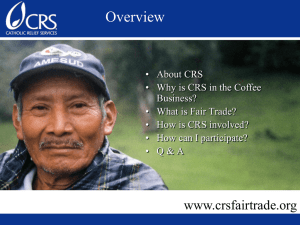
![저기요[jeo-gi-yo] - WordPress.com](http://s2.studylib.net/store/data/005572742_1-676dcc06fe6d6aaa8f3ba5da35df9fe7-300x300.png)

